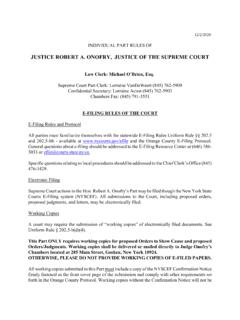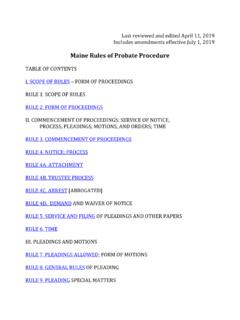Transcription of Casebook on Contract Law - pbookshop.com
1 Casebook on Contract Law12th EditionJill PooleLLB, LLM, FHEA, FRSA, FCI Arb, Barrister of Lincoln s Inn Deputy Dean, Aston Business School Professor of Commercial Law and former Head of Aston Law,Aston Clarendon Street, Oxford, OX2 6D P,United KingdomOxford University Press is a department of the University of furthers the University s objective of excellence in research, scholarship,and education by publishing worldwide. Oxford is a registered trade mark ofOxford University Press in the UK and in certain other countries Jill Poole 2014 The moral rights of the author have been assertedNinth edition 2008 Tenth edition 2010 Eleventh edition 2012 Impression: 1 All rights reserved.
2 No part of this publication may be reproduced, stored ina retrieval system, or transmitted, in any form or by any means, without theprior permission in writing of Oxford University Press, or as expressly permittedby law, by licence or under terms agreed with the appropriate reprographicsrights organization. Enquiries concerning reproduction outside the scope of theabove should be sent to the Rights Department, Oxford University Press, at theaddress aboveYou must not circulate this work in any other formand you must impose this same condition on any acquirerPublic sector information reproduced under Open Government Licence ( )Crown copyright material is reproduced under Class Licence Controller, HMSO (under the terms of the Click Use licence)
3 Published in the United States of America by Oxford University Press198 Madison Avenue, New York, N Y 10016, United States of America British Library Cataloguing in Publication DataData availableLibrary of Congress Control Number: 2014932846 ISBN 978 0 19 968723 7 Printed in Italy Lavis TNLinks to third party websites are provided by Oxford in good faith andfor information only. Oxford disclaims any responsibility for the materialscontained in any third party website referenced in this Contract is an agreement that is legally enforceable. This chapter deals with how we determine the existence of the 1 Subjectivity versus objectivityA) Objectivity prevailsSmith v Hughes(1871) LR 6 QB 597 BLACKBURN J: If, whatever a man s real intention may be, he so conducts himself that a reasonable man would believe that he was assenting to the terms proposed by the other party , and that other party upon that belief enters into the Contract with him, the man thus conducting himself would be equally bound as if he had intended to agree to the other party s terms.
4 Robert Goff LJ, in Allied Marine Transport Ltd v Vale do Rio doce Navegacao SA, The Leonidas D [1985] 1 WLR 925, 936G H, put the matter thus:[I] f one party , O, so acts that his conduct, objectively considered, constitutes an offer, and the other party , A, believing that the conduct of O represents his actual intention, accepts O s offer, then a con-tract will come into existence, and on those facts it will make no difference if O did not in fact intend to make an offer, or if he misunderstood A s acceptance, so that O s state of mind is, in such circumstances, ) Subjectivity has some relevanceAlthough the offeror s subjective intentions are irrelevant if the offer is reasonably, and objectively, understood in a particular way by the offeree, the offeree must believe that the offer represents the actual intentions of the offeror.
5 To this extent, the offeree s subjective intentions are relevant. If the offeree knows or ought reasonably to have known at the time of the purported acceptance that the offeror has made a mistake relating to the terms of the offer, the offeree cannot purport to accept that v Colin & Shields[1939] 3 All ER 566 The defendants contracted to sell 30,000 Argentine hare skins to the plaintiff, but by mistake offered them at a price per pound instead of per piece. In the pre-sale negotiations, reference had Agreement2 2 Agreement18always been made to the price per piece and never to the price per pound, and there was expert evidence that Argentine hare skins were generally sold at prices per : Since the plaintiff could not reasonably have supposed that the offer contained the offer-ors real intention, there was no binding 1.
6 Thus it is first necessary to examine how the offeror s words and conduct might reasonably have appeared to the offeree. The offeree cannot then accept if he knew, or it can be established that he ought reasonably to have known, that the offeror was making a mistake. In Chwee Kin Keong v Pte Ltd [2005] 1 SLR(R) 502, the Singapore Court of Appeal regarded what the offeree ought reasonably to have known as evidential factors or reasoning processes in reaching the conclusion that there was, in fact, knowledge of the mistake in the sense of actual knowledge, if the price of goods on an Internet site is so absurdly low in relation to its known market value, it stands to reason that a reasonable man would harbour a real suspicion that the price may not be correct or that there may be some troubling underlying basis for such a pricing (quoting the judge at first instance.)
7 [2004] SLR(R) 594, [145]). In Commission for the New Towns v Cooper (GB) Ltd [1995] Ch 259 (see page 117), actual knowledge was considered to extend to wilfully and recklessly failing to make such inquiries as an honest and reasonable man would make (category (iii) actual knowledge or Nelsonian blindness ).2. In Centrovincial Estates plc v Merchant Investors Assurance Co. Ltd [1983] Com LR 158, the defendants accepted a figure of 65,000 per annum during a rent review, where the original rent had been 68,320 and the rent review clause stated that in no circumstances should the rent be reduced below the rent payable immediately before the review.
8 This figure had been offered in error and the correct figure offered should have been 126,000. The defendants sought to hold the plaintiffs to the 65,000 figure, claiming that there was a binding agreement to this figure. The Court of Appeal agreed that there was a binding agreement at 65,000, since there was no proof that the defendants either knew or ought reasonably to have known of the plaintiffs error at the time when they purported to accept , although we might think that the defendants should have known of the plaintiffs (offerors ) mistake given the terms of the rent review clause, the burden of proving the defendants subjective inten-tions and that the defendants knew that the plaintiffs did not intend to be bound by the 65,000 figure rested with the plaintiffs, and that burden had not been discharged on the facts.
9 It also appears that it would not be discharged if the defendants had simply not addressed any thought to the question of what the plaintiffs intended at the burden of proof was also explained at first instance in Maple Leaf Macro Volatility Master Fund v Rouvroy [2009] EWHC 257 (Comm), [2009] 1 Lloyd s Rep 475, in which it was considered that, on an objec-tive assessment, the parties had indicated an intention to be bound to a funding agreement. The defendants failed to show that the claimants did not believe that the defendants intended to be SMITH J: 228. However, there are circumstances in which the parties to what would objectively be held to be contractual are not legally bound by it under English law.
10 If the other parties actually and reasonably believed that the defendants intended to make a Contract , there would be a concluded Contract , but not if the other parties knew or would reasonably have believed that that was not the defendants intention and not, in my judgment, if the other parties had simply formed no view one way or the other as to whether the defendants so intended. That is the opinion expressed by Professor Sir Gunter Treitel in Chitty on Contracts, (2008) 30th Ed at para 2-004, and I agree with it. The defendants submit that they are not contractually bound even if on an objective assessment they and the claimants evinced an intention to be Thus the defendants argument depends upon them showing that the claimants did not believe that the defendants intended to be bound.






